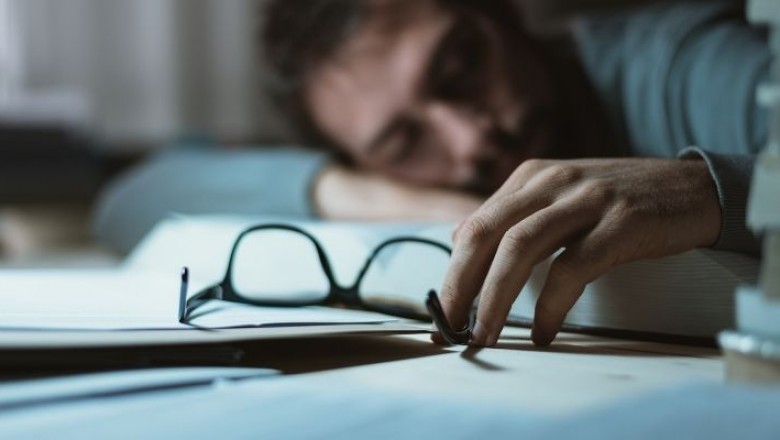views

Hit Snooze! The Effects of Sleep on Quality of Work
Constantly tired? Working remotely throwing off your sleep schedule? Pulling an all-nighter? You aren't alone. In COVID-19, our schedules have all been upended. But, what are the work productivity impacts of poor sleep? Learn how sleep affects your work performance with productivity app LIFE Intelligence.
Work, sleep, wake up, repeat. Work and sleep are two of the most time consuming portions of our daily lives. Assuming an adult sleeps for the recommended average of 7 to 9 hours a night, and works another 8 hours throughout the day, work and sleep can consume two thirds of our lives combined. But this assumption is not entirely accurate. As stated by the CDC, 1 in 3 adults experience less than 7 hours of sleep a night. Although the amount of sleep people experience appears to be decreasing, the amount of work has not. So how are humans functioning with so much work piling up, while also running on less than 7 hours of rest? The answer: not very well.
The 5 stages of sleep are characterized by the brain activity present when recording using an Electroencephalograph (EEG). EEG tests are used to measure electrical brain activity and possible variations in said activity. As stated by Mary Carskadon and William Dement, these 5 stages are split into two categories: non-rapid eye movement (NREM) sleep and rapid eye movement (REM) sleep. Stages 1-4 make up the NREM category, and each stage differs in EEG activity. The purpose of NREM sleep, specifically stages 3 and 4, is to promote rest for the brain. For this reason, the body elicits low metabolic activity, which permits energy storage.
On the other hand, REM sleep promotes brain development and learning. NREM and REM sleep optimally occur within a 90 minute cycle. However, with reduced total hours of sleep, the body rebalances itself by shortening NREM and REM stages. As a result, sleep’s energy storage and memory consolidation benefits are weakened. Such hindrances in mental facilities range in severity, depending on one’s omission of the latter cycles of sleep. Regardless, a common side effect of sleep deprivation is cognitive impairment.
Cognition refers to one’s ability to acquire knowledge through the use of memory, attention, emotion, information processing, and other related processes. Cognitive processing is extremely important when functioning in day to day life, especially when performing tasks that require attention-based skills. In turn, loss of sleep has been shown to have detrimental effects on human cognitive abilities.
Dr. Dov Zohar et al. studied the ways that sleep deprivation negatively impacted the emotional processes of medical residents. Medical residents received three phone calls throughout the day, with each phone call prompting them to rate their physical and emotional states at the present hour. These phone calls took place during the resident’s working day, spanning across three days each session. The data acquired revealed that sleep loss had two different effects on emotional states. Not only were negative emotions amplified in response to disruptive events, but positive emotions were dulled. Positive effects from events viewed as goal-enhancing were reduced and had significantly less impact on the participants.
Additionally, Dr. June J. Pilcher and Dr. Amy S. Walters analyzed the effects of sleep deprivation on the cognitive performance of college students. Whereas half the participants underwent 24 hours of sleep deprivation, the other half received the recommended 8 hours of sleep. Following the sleep level manipulation, students performed the Watson-Glaser Critical Thinking task, which tests a person’s ability to process information and draw conclusions. Furthermore, participants self reported the amount of effort they put into the task and their estimated performance quality.
The results showed that sleep-deprived students performed at a lower level on the critical thinking assessment and rated their performance levels as higher than students that experienced 8 hours of sleep. The combined results of both experiments indicate that sleep deprivation can lead to cognitive deficits of varying severity, which occur outside one’s awareness. This is especially dangerous in fields requiring high levels of attention and precision, such as the medical field. In addition to sleep deprivation, variable sleep schedules have been shown to hinder cognition and work performance as well
Although partial sleep is better than no sleep at all, research has shown that changing sleep schedules can lead to negative effects on the body. Researchers Abdullahi Fido and Adel Ghali investigated how working variable 8 hour shifts affected quality of sleep and work performance in 200 participants. The subjects were assessed using a sleep quality index and 2 self administered questionnaires, and were compared to workers on a fixed 8 hour daytime schedule. The data showed that participants experiencing an 8 hour variable shift were prone to heavy smoking and job stress. Furthermore, these same workers had high reports of sleep disturbances, fatigue, and poor work performance.
Similarly, Andrew J. K. Phillips et al. explored the patterns between sleep/wake periods and academic performance. A total of 61 undergraduate students were examined for 30 days. Participants also reported their GPA’s before and after the examination period. The study showed a positive correlation between sleep regularity and academic performance. Participants with regular sleep schedules were shown to perform better in school compared to those with irregular sleep schedules. This was also true for those that had polyphasic sleep schedules, meaning distributing sleep throughout the day while maintaining the recommended 8 hours of sleep. Therefore, academic performance was found to be less dependent on sleep time, but rather dependent on sleep regularity. However, this is not a causal relationship and more research is needed to establish this correlation.
So what now? How does one move forward knowing that their sleep patterns may be what is obstructing their path to success and well being? Well all that’s left now is to discover new ways to improve your sleep.
If your first hour awake can set the tone for the rest of your day, it’s worthwhile to consider ways to improve sleep. By improving your sleep hygiene, you can start the day off feeling refreshed and energized. One way in which you can do so is by using mindfulness and acceptance. Jason C. Ong, Christi S. Ulmer, and Rachel Manber propose that by using awareness of mental and physical states associated with insomnia and symptoms of sleep deprivation, one can adapt and beneficially shift their approach to negating these symptoms. This consists of objectively viewing the problems at hand and adopting behaviors to combat said problems. This included using internal cues, such as feelings of drowsiness, to determine when to go to bed, rather than external cues, such as going to bed by a certain time.
Through these practices, the authors suggest congruence between internal states and external decisions will lead to improved mental and physical states. Additionally, this proposal is supported by numerous studies cited in the article performing metacognitive therapies on various groups of individuals. For example, Keunyoung Yook et al. utilized mindfulness based cognitive therapies to improve quality of sleep for patients with anxiety disorders. The study found that such therapies are successful at relieving insomnia symptoms and promote the potential for further studies to solidify these findings. In conclusion, being mindful of your own actions and approach to sleep can aid in improving sleep hygiene and, in turn, mental health.
Regular and consistent sleep schedules should be priorities when striving for success. Not only does sleep improvement benefit your subjective well being, it also strengthens work performance and cognition. Although it may seem beneficial to spend that extra hour of your night revising your project for the 5th time over, skipping out on sleep may impede how you perform on your upcoming tasks. Even a short nap is proven to improve your memory and focus.
Additionally, outside of work life, social life can benefit from improving sleep hygiene as well. Cognition goes beyond what happens in the classroom or at the office. Simply being there for your friends and family can become more and more difficult when you’re running on little to no sleep. Social situations seem laborious and spacing out mid conversation becomes more frequent. Attention, decision making, and even emotional processes are affected in every aspect of life. So why not get that extra hour of sleep?
--
For more scientific tips to improving your holistic health, sleep, and social connection, download LIFE Intelligence for free today. Unlike other self care apps, LIFE Intelligence is fully backed in scientific studies, fore a uniquely type-A approach to wellness.
References:
1 in 3 adults don't get enough sleep. (2016, February 16).
Carskadon, M.A., & Dement, W.C. (2011). Monitoring and staging human sleep. In M.H. Kryger, T. Roth, & W.C. Dement (Eds.), Principles and practice of sleep medicine, 5th edition, (pp 16-26).
Zohar, D., Tzischinsky, O., Epstein, R., & Lavie, P. (2005, January 01). Effects of Sleep Loss on Medical Residents' Emotional Reactions to Work Events: A Cognitive-Energy Model.
Pilcher, J. J., & Walters, A. S. (2010, March 24). How Sleep Deprivation Affects Psychological Variables Related to College Students' Cognitive Performance.
Fido, A., & Ghali, A. (2008, October 03). Detrimental Effects of Variable Work Shifts on Quality of Sleep, General Health and Work Performance.
Phillips, A., et al. (2017, June 12). Irregular sleep/wake patterns are associated with poorer academic performance and delayed circadian and sleep/wake timing.
Ong, J., Ulmer, C., & Manber, R. (2012, August 20). Improving sleep with mindfulness and acceptance: A metacognitive model of insomnia.
Keunyoung, Y. et al. (2008, June). Usefulness of Mindfulness-Based Cognitive Therapy for... : The Journal of Nervous and Mental Disease.











